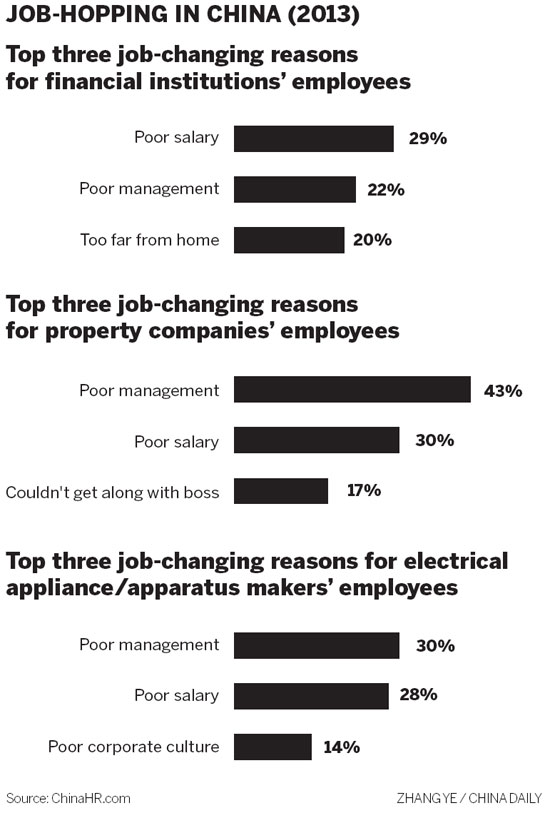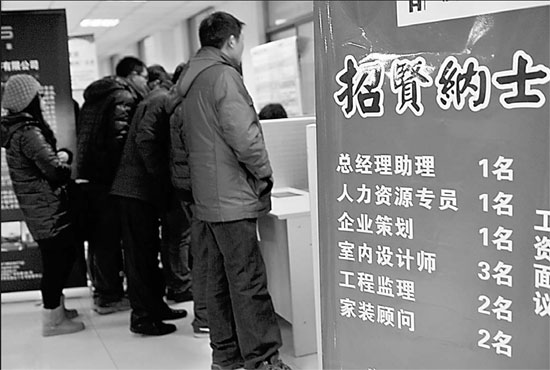Job-hopping sneaks in early
Updated: 2013-02-18 08:03
By Wang Wen (China Daily)
|
||||||||
|
Job seekers at a talent fair in Huai'an in East China's Jiangsu province. Some employees have started to consider moving on even before the Spring Festival this year, much earlier than the usual peak season in March and April. Chen Zhongjun / For China Daily |
Year of the Snake not seen as very auspicious for the Chinese economy
The peak season for job-hopping in 2013 came earlier than usual because of economic uncertainty.
Some employees started to consider moving on even before the Spring Festival this year, much earlier than the usual peak season in March and April.
The months after the Lunar New Year are traditionally the best to find a new job because companies have completed their recruitment plans for the year and consequently just released job vacancies.
The year-end bonus is another important motivation for job-hoppers who leave their positions after the festival.
But the situation is different this year.
Pessimism about the industries affected by the economic downturn encouraged employees to search for new jobs as soon as possible, said experts.
It forced businesses to start looking for new staff before the festival to cope with the exodus of existing workers.
Many enterprises adjusted their strategies in 2012 so it is understandable that employees are not sure about their company's future during this period, said Liu Xingyang, a senior human resource expert with ChinaHR.com, the Chinese subsidiary of Monster Worldwide.
Employees complained about chaotic management and started to look for new jobs earlier in 2013, he said.
About 27 percent of the job-hoppers said they were quitting because of their company's poor prospects, according to a report on job-hopping from ChinaHR.com.

Zhang Gang, a manager at a real estate agency in Beijing, said he started looking for a new job early on and hoped to settle down in one before the festival.
"I want to get an ideal position before the festival, also before plenty of other people start chasing just one job," Zhang said in January.
Zhang said lack of job security in real estate drove him back to the consumer industry, in which he used to work.
The 28-year old said his salary was 50,000 yuan ($8,035) a month during the good times but now its is less than 50 percent of that.
"This year's bonus will not be particularly attractive either," he said. "It is not wise to wait for it."
Many companies reduced pay rises this year because of fears about the economy, the main reason chosen by 26 percent of job-hoppers looking to move on, according to ChinaHR's report.
The recruitment agency interviewed a selection of businesses. Only 0.8 percent of them said they will increase their employees' salaries by 20 percent or more in 2013. The percentage was 2.7 percent in 2012.
The number of companies awarding pay rises between 11 and 20 percent also fell from 16.7 percent in 2012 to a predicted 11.2 percent in 2013, according to the agency's report.
Meanwhile, the continuous rise of the consumer price index, which measures inflation, caused employees' living costs to increase, leading to high expectations over salary rises to relieve financial pressures.
"If their expectations are not achieved, they will have to find new jobs," said Liu Xiangyang.
ChinaHR.com also discovered financial, real estate and electric appliance manufacturing industries have more job-hoppers compared with other industries so far this year.
Employees in the financial industry are more sensitive to rising incomes and they feel the need for a higher quality of life, Liu said.
Some have chosen to weather the economic ill winds, while some have decided to leave.
Wang Li, a 27-year-old woman who has worked for an accounting firm in Beijing for three years, said she was asked to take five days of unpaid leave by the end of 2012. She used to be too busy to take year-end leave in the years before 2012.
Wang said she had less work to do recently and was not sure about her year-end bonus, although she received a 20-percent salary rise last October.
However, she said she and her colleagues would try to keep their jobs.
"It is not a good time to be quitting the job because the whole industry faces economic problems and there are few job opportunities in the market at the moment," she said.
Wang has good reasons for believing that.
American Express Co, the US multinational financial services corporation headquartered in New York, plans to eliminate 5,400 staff jobs in order to cut costs and adjust its business, the company said on Jan 10.
Goldman Sachs Group Inc, the US investment banking firm, said in July last year it would cut 1,000 staff worldwide.
"Keeping one's current job is a wise decision just now," said Huang Yi, a 23-year-old woman who has worked for one of the so-called "Big Four" accountancy firms since July last year.
If the employees really want to change jobs, the automotive and retail industries would be good choices, experts said.
"The automotive market and retail industries will both be very active," said Max Price, a partner at Antal China, a United Kingdom recruitment and headhunting company.
He said there is lots of organic growth forecast within the sectors.
Companies in these industries want experienced people rather than fresh graduates, which will lure some job-hoppers.
But Price nonetheless suggested people should be cautious about changing jobs and should stay three to five years with a company before moving on to a new role.
"Job-hopping every two or three years is terrible for career development in the long term," he said.
wangwen@chinadaily.com.cn

(China Daily 02/18/2013 page14)

 In Photos: 7.0-magnitude quake hits Sichuan
In Photos: 7.0-magnitude quake hits Sichuan
 Li Na on Time cover, makes influential 100 list
Li Na on Time cover, makes influential 100 list
 FBI releases photos of 2 Boston bombings suspects
FBI releases photos of 2 Boston bombings suspects
 World's wackiest hairstyles
World's wackiest hairstyles
 Sandstorms strike Northwest China
Sandstorms strike Northwest China
 Never-seen photos of Madonna on display
Never-seen photos of Madonna on display
 H7N9 outbreak linked to waterfowl migration
H7N9 outbreak linked to waterfowl migration
 Dozens feared dead in Texas plant blast
Dozens feared dead in Texas plant blast
Most Viewed
Editor's Picks

|

|

|

|

|

|
Today's Top News
Live report: 7.0-magnitude quake hits Sichuan, heavy casualties feared
Boston suspect cornered on boat
Cross-talk artist helps to spread the word
'Green' awareness levels drop in Beijing
Palace Museum spruces up
First couple on Time's list of most influential
H7N9 flu transmission studied
Trading channels 'need to broaden'
US Weekly

|

|








